Exercise Science News
Major League Partnership
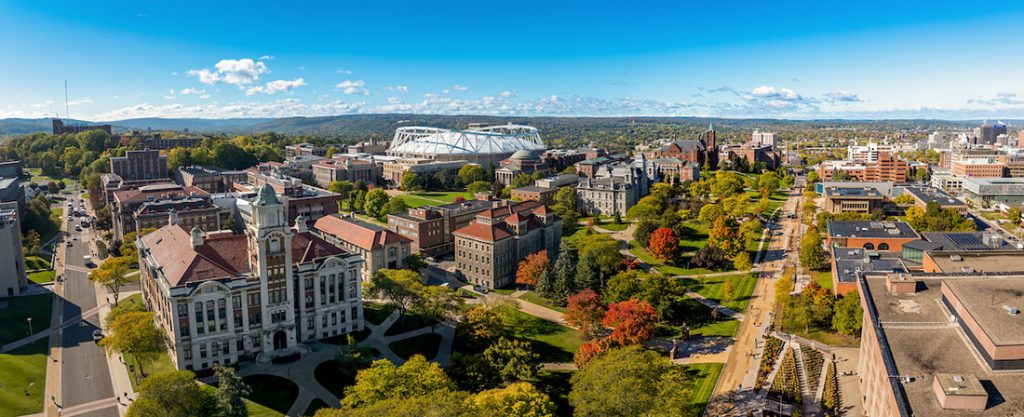
A new partnership between Syracuse University and the Major League Baseball Players Association (MLBPA) will create academic pathways for current and former players. Under this agreement, Syracuse University will offer market-relevant and industry-specific online degrees, certificates and credentials, as well as a range of non-credit professional development and executive education training programs, courses and workshops.
Responsive to the MLBPA’s desire to expand opportunities for career growth to its thousands of players, the new cross-campus collaboration taps into the expertise of several of the University’s schools and colleges, including the new David B. Falk College of Sport, the Newhouse School of Public Communications, the Whitman School of Management and the College of Professional Studies (CPS).
“My fellow deans and I are excited to partner with the Major League Baseball Players Association to provide the Syracuse University experience to those interested in pursuing our vast academic offerings,” says Falk College Dean Jeremy Jordan, whose initial discussions with the MLBPA inspired the creation of this new initiative. “This partnership reflects our collectively held value that higher education should be achievable for everyone, regardless of the demands of their profession or personal circumstances. For athletes and professionals with unpredictable schedules, our online programs offer the perfect balance of flexibility, robust academic support and real-world applicability—all without compromising their careers.”
“The Major League Baseball Players Association is thrilled to partner with Syracuse University to provide our members with exceptional educational opportunities,” says Chris Singleton, MLBPA special assistant for player resource programs and a former major league outfielder. “This collaboration underscores our commitment to supporting players both on and off the field, ensuring they have access to world-class academic resources that empower their personal and professional growth.”
The MLBPA represents the 1,200 players on major league 40-man rosters, as well as approximately 5,500 minor league players. This new partnership creates opportunities for these players to pursue several noteworthy objectives, including the following:
- Skill Development and Post-Career Readiness: The partnership will align market-relevant curricula and programming with players’ post-career aspirations and needs, ensuring they acquire meaningful skills and knowledge.
- Research and Innovation: The MLBPA and Syracuse will collaborate on research projects that inform progressive and advanced programming for professional athletes. These efforts may lead to the development of new technologies, products or processes, benefiting the MLBPA and other professional athletic organizations.
- Practical Experience: The partnership will provide Syracuse students with opportunities for internships, co-op programs and hands-on projects with the MLBPA. This practical experience will enhance learning, make students more competitive and serve as a potential pipeline for talent to the MLBPA and other professional athlete associations.
- Networking Opportunities: Players will gain access to professional mentors associated with Syracuse in sports, broadcasting and business, to aid them in post-playing career development and job opportunities.
Dedicated admission specialists and academic advisors will tailor academic pathways in support of the unique needs of each participant. These educational opportunities will be accessible through a number of formats, including online, on campus and at Syracuse’s Study Away sites in New York City, Washington, D.C., and Los Angeles. The University will also offer an online academic English program to prepare non-native English speakers for success in their non-credit programs, courses and workshops.
Visit the Syracuse University College of Professional Studies website to learn more about this innovative partnership.
About Syracuse University
Syracuse University is a private research university that advances knowledge across disciplines to drive breakthrough discoveries and breakout leadership. Our collection of 13 schools and colleges with over 200 customizable majors closes the gap between education and action, so students can take on the world. In and beyond the classroom, we connect people, perspectives, and practices to solve interconnected challenges with interdisciplinary approaches. Together, we’re a powerful community that moves ideas, individuals, and impact beyond what’s possible.
Agent of Change
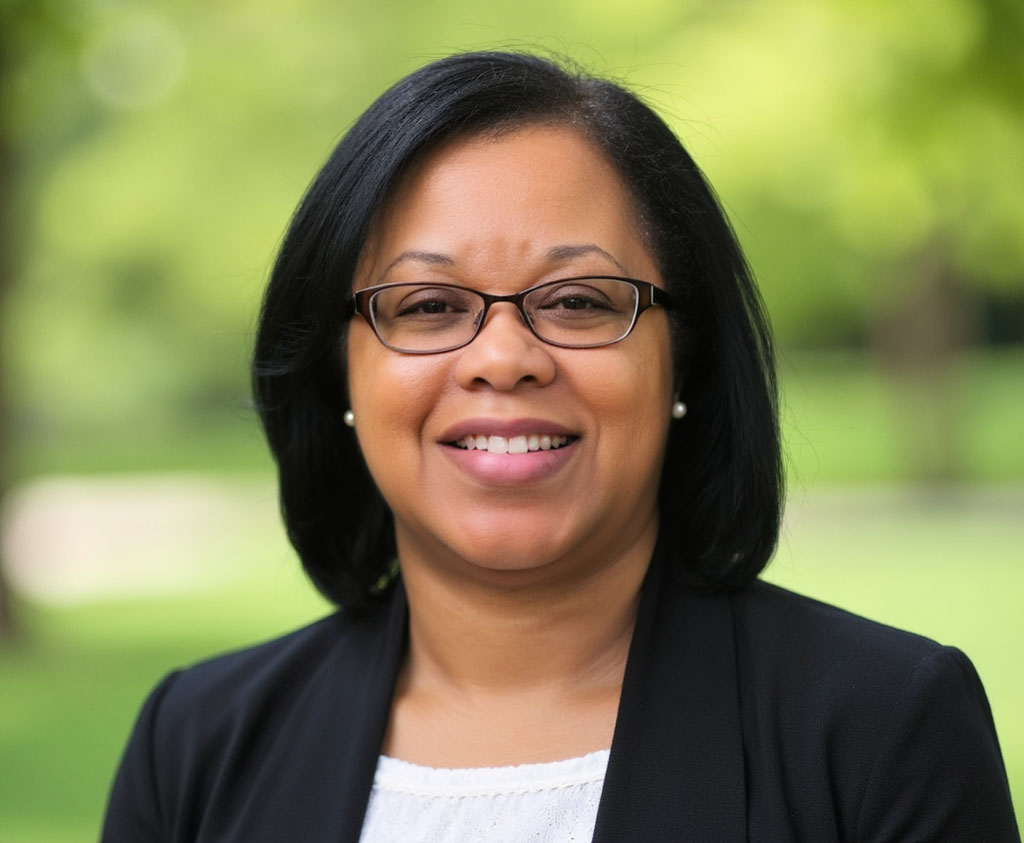
Chandice Haste-Jackson, Ph.D., Associate Dean of Student Services and interim Associate Dean of Diversity, Equity, Inclusion and Accessibility in Syracuse University’s Falk College of Sport and Human Dynamics, has been selected by the Executive Leadership Institute at Clark Atlanta University (HBCU ELI) as one of 46 outstanding candidates for its 2025 Community of Fellows.
This milestone celebrates individual achievements and underscores the critical importance of nurturing the next generation of executive leaders within Historically Black Colleges and Universities (HBCUs). Now in its fifth year, HBCU ELI is noted as one of the most prestigious executive leadership programs for HBCUs in the United States.
“I am honored to have been selected for the 2025 HBCU ELI Community of Fellows,” Haste-Jackson says. “Given the climate of higher education today, it is imperative that leaders are prepared to navigate through uncertainty and crisis and embody the skills and dispositions necessary to address contemporary and emerging issues.
“Participating in the HBCU ELI provides the opportunity to expand my skills and knowledge of higher education administration, and engage and learn from esteemed Legacy Leaders who have led institutions through the social, economic, racial, and historical contexts of higher education in this country,” she says.
Haste-Jackson, an associate teaching professor in the Department of Human Development and Family Science, has held a variety of leadership positions, including: Interim Director of First Year Seminar (FYS 101), Director of the Syracuse University School of Education Liberty Partnerships Program; Executive Director of a transitional housing homeless shelter for women and children; Executive Director of an historical African American settlement house; and Assistant Director of an inner-city community center.
Haste-Jackson received her bachelor’s degree in cultural anthropology from Syracuse University, her master’s degree in behavioral sciences-psychology from Cameron University, and her Ph.D. in child and family studies from Syracuse (now Human Development and Family Science). She currently serves on several nonprofit boards and is a consultant for the My Brother’s Keeper Syracuse initiative founded by President Barack Obama.
The Community of Fellows are proven executive leaders and change agents who participate in a series of virtual and residency seminars providing knowledge and hands-on skills. HBCU ELI offers a transformative learning experience that empowers participants to address the complex challenges facing HBCUs today. Through academic excellence, practical experience, and mentorship, graduates emerge as visionary leaders who are prepared to drive positive change and advance the legacy of HBCUs.
According to the National Center for Education Statistics, HBCUs were established prior to 1964 with the principal mission of educating Black Americans. Although these institutions were developed in an environment of legal segregation, they contributed substantially to the progress of Black Americans by providing access to higher education. The HBCUs of today welcomes students from all ethnic and international backgrounds and lead the way in creating inclusive and transformative cultures of belonging.
About HBCU ELI at Clark Atlanta University
The HBCU Executive Leadership Institute at Clark Atlanta University (HBCU ELI) is a groundbreaking incubator for recruiting and developing the future presidents of America’s Historically Black Colleges and Universities. ELI equips high-potential leaders with tools and strategies that support the education and business goals of more than 100 HBCUs. Through ELI, the ability of HBCUs to survive and thrive is improved. In addition to granting thousands of degrees each year, HBCUs boast illustrious alumni like Martin Luther King, Jr., Oprah Winfrey, and former Vice President Kamala Harris, among others. Visit hbcueli.com for more information and join the conversation on social media @hbcueli; #hbcueli.
Voices of Service
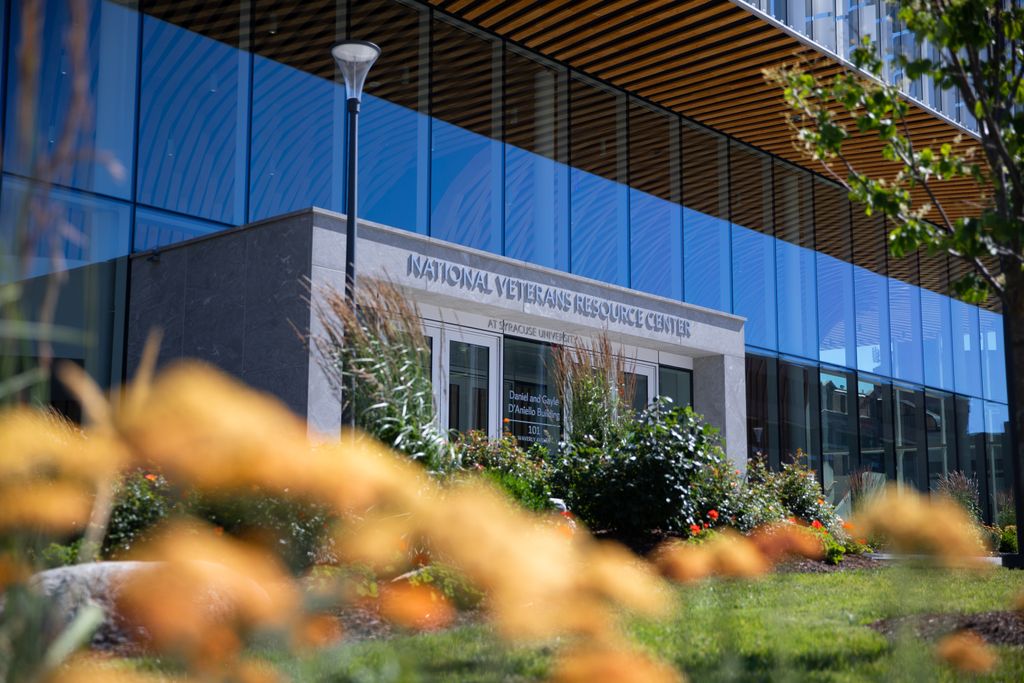
Call for Posters
The Institute for Veterans and Military Families (IVMF) and Academic Affairs invite you to submit poster abstracts for an inaugural event spotlighting diverse and dynamic work related to the interests and needs of veterans and military-connected populations. By showcasing ongoing and planned research projects, curricular innovations, program initiatives, and community engagement, we aim to amplify these efforts and foster new collaborations across our campus and community.
When and Where
- Date: April 10, 2025
- Location: National Veterans Resource Center (Syracuse University)
- Time: 12:30 PM – 3:00 PM
Who Should Submit and Attend?
- Syracuse University students (undergraduate, graduate) and trainees (postdocs)
- Syracuse University faculty and staff
- Community partners and collaborators in the Central New York region
Topics of Interest
We seek posters that highlight completed, planned, or in-progress research, curricular work, or applied services and programming related to the lived experiences, needs, or interests of veterans and/or military-connected families and individuals. We welcome contributions from all disciplines and fields that intersect with veteran and military-connected topics. Relevant topics include, but are not limited to, the following:
- Research Projects and Analyses that are completed, planned, or in-progress
- Curricular or Course-Related Efforts that focus on or integrate veteran- and military-related content
- Programs and Services that benefit or support veterans and/or military-connected populations
- Student Internships or Field Placements involving veteran research, support, outreach, or engagement
Important Dates
- Abstract Submission (250 words): Due by February 24, 2025
- Notification of Acceptance: By March 7, 2025
- Final Digital Poster Email Submission: By April 7, 2025, to Julianna Fitz at jlfitz@syr.edu
Submission Details
- Submit abstracts to Julianna Fitz at jlfitz@syr.edu
- Include: Title (up to 150 characters); Author name(s); Affiliation(s); and Email address(es)
Event Schedule
Requirements, Process, and Questions
- All presentations will be in person and posters must be printed.
- Presenting authors are requested to attend the poster session.
- Presenters are responsible for printing their own posters.
- Posters should be no larger than 30″ x 40″ (portrait or landscape).
- Easels, foam board, and binder clips will be provided.
- Posters will be accepted based on the quality of the abstract and the order received.
- For questions, please contact Jamie Winders at jwinders@syr.edu
Welcome Back!
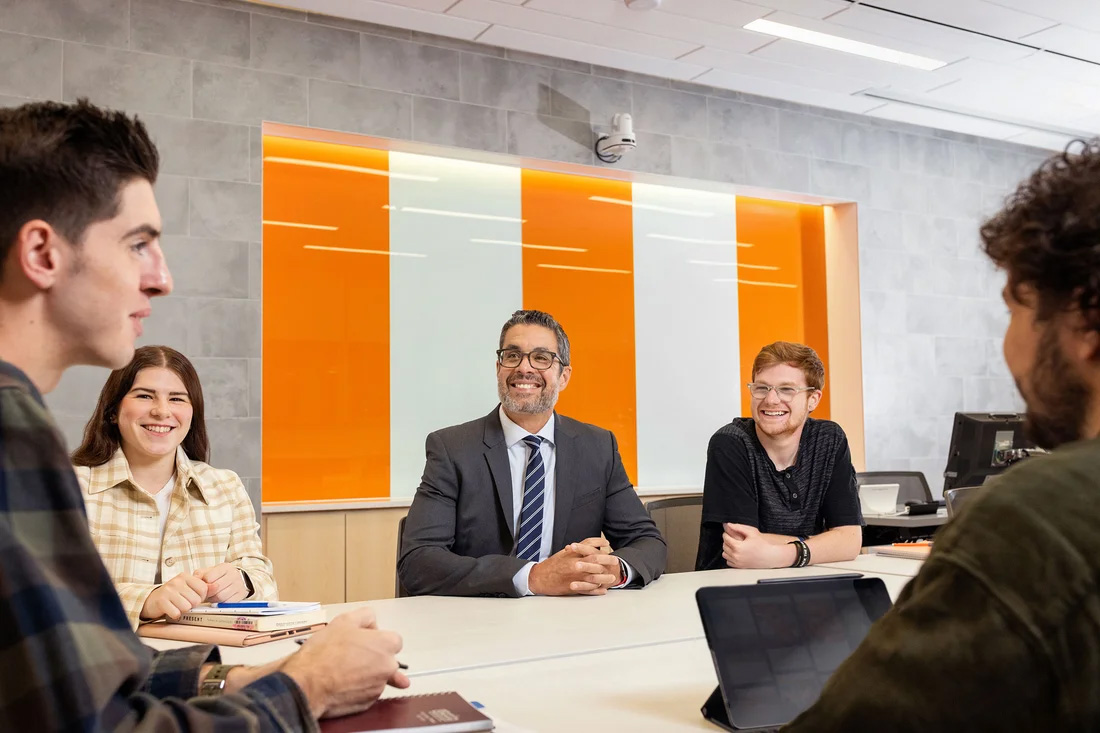
Dear Falk College Students,
Welcome back to Syracuse University! I hope you had a joyous holiday season and an opportunity to relax, spend time with family and friends, and enjoy the football team’s convincing win over Washington State in the Holiday Bowl!
I’m excited about the new semester and I look forward to watching all you will accomplish as you pursue your academic and professional goals this spring. As classes begin, I want to remind you of resources at Falk College and on campus that will help you succeed:
Official Syracuse University Communications
Syracuse University email is the primary communication method at the University. Your professors and University offices will contact you with important information using your Syracuse University email address (ending in “@syr.edu”), not your personal email address. It’s important to read your University email at least once every day so you’re aware of the latest information that’s essential to you.
Student Support Services
Falk College Student Services is an important resource in your support system at Syracuse University. Student Services counselors are here to provide you with academic advising and help you meet your requirements and goals. They are also your resource for private consultation related to student social and emotional concerns. If you have any concerns this semester, please contact Student Services or visit Falk 330, Barclay Suite, in the Falk Complex.
I encourage you to connect with the staff at Falk Career Services who can help you prepare for life after college through career exploration, internship and job searching, professional networking, and more. They are also located in Falk 330, or you can search for opportunities through Handshake, the University’s job search and professional events portal.
In addition, you can connect to spiritual life on campus at Hendricks Chapel, and health and counseling services in the Barnes Center at the Arch.
Student Spaces in Falk College
The Student Lounge, located in Falk 216, is available to you anytime the Falk Complex is open. The lounge has a microwave, refrigerator, and vending machines for student use. Across the hall from the Student Lounge is Falk Café, which is open from 8:00 a.m. to 3:00 p.m. Monday through Friday starting Jan. 13. Visit the Food Services website for up-to-date operating hours for cafés and dining centers across campus.
There are several computer labs in the Falk Complex. Falk 113 is a PC lab, and Falk 229 is a quiet study area that has both PCs and Macs available for your use. Both spaces are available to students at any time. Falk 400 and 407 are PC labs that are also used as teaching classrooms. When class is not in session, they are open for student use. You may check their schedule of availability using the 25Live website. You may also use the quick-print stations in Falk 216 and 229 for printing and email. These stations log out automatically after 10 minutes of use.
Ways to Get Involved
There are more than 300 student organizations at Syracuse University. Be sure to explore organizations that might be outside your usual interests, too. Remember, this is a great way to meet new people and discover something new about yourself!
There are many exciting events planned for Spring 2025, starting with the historic 40th Annual Rev. Dr. Martin Luther King Jr. Celebration Jan. 26 at the JMA Wireless Dome and leading to Commencement Weekend May 10-11. You can find more activities and events on campus by visiting the Syracuse University Calendar. For more resources and opportunities to make the most of your Syracuse experience, I encourage you to visit syracuse.edu/life/students.
I wish you the best this semester and please reach out to us if you’re in need of services and support. On behalf of the Falk faculty and staff, I wish you continued success on your journey here at Falk College and the wider Syracuse University community.
Go Orange!
Jeremy S. Jordan, Ph.D.
Dean
Falk College
Mind Over Matter
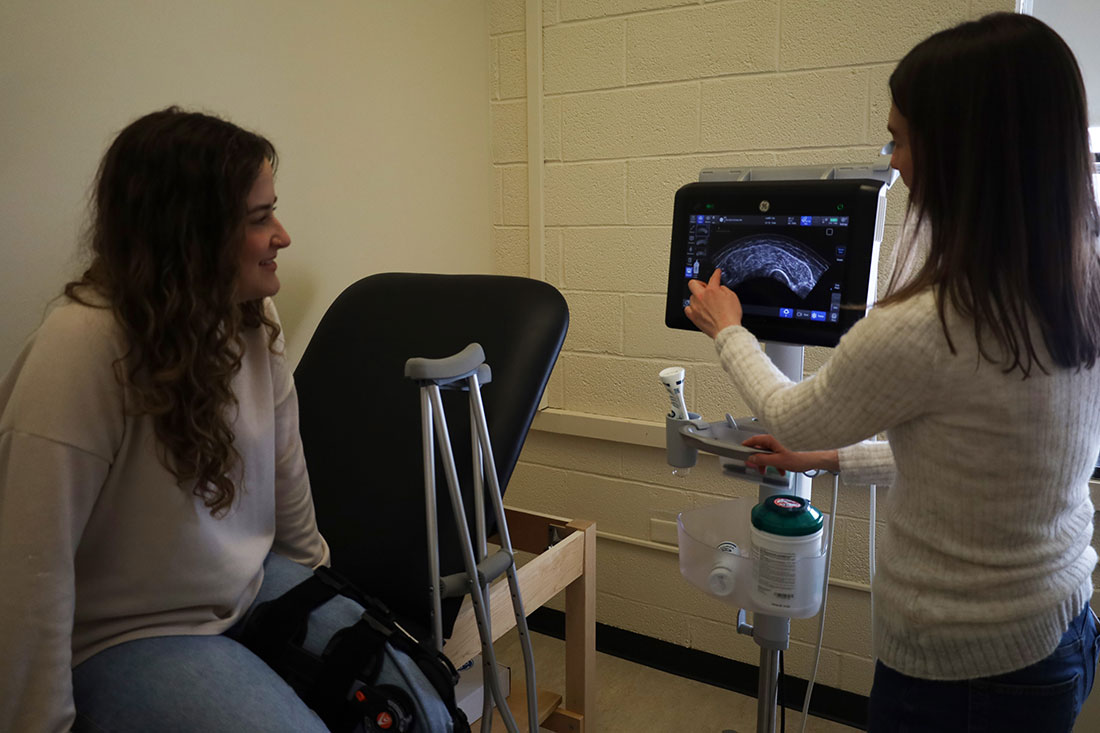
Kylie Harmon, an assistant professor in the Department of Exercise Science in the Falk College of Sport and Human Dynamics, has always been fascinated by this deep-rooted idea that a person could control a physical condition with their mind.
More specifically, she wondered if a person could use their mind to preserve muscle mass and strength during a prolonged period of immobilization. For Harmon, turning this idea into actual research was sparked by a published study where researchers used neuromuscular electrical stimulation on muscles immobilized in a cast to preserve leg strength and mass. Surprisingly, mass was preserved, but strength was not.
Harmon’s research found that given the role of the nervous system in immobilization-induced weakness, targeted interventions may be able to preserve muscle strength but not mass, and vice versa. Though preliminary, her findings highlight the specific nature of clinical interventions and suggest that muscle strength can be independently targeted during rehabilitation.
Harmon’s innovative research, which was conducted over several months and with nearly 40 participants, was published this past spring by the peer-reviewed scientific journal Experimental Physiology.
We sat down with Harmon to learn more about her research, most surprising findings, and next steps. Here’s that discussion:
What did you learn from the previous research on this topic and how did that frame what you wanted to accomplish with your research?
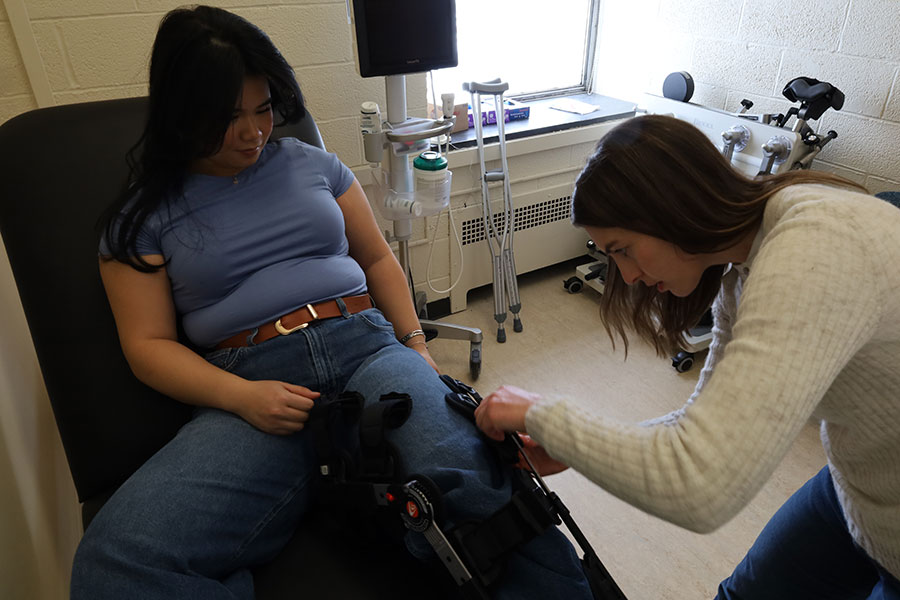
Those researchers saw that daily muscle stimulation helped to maintain muscle size, but didn’t impact muscle strength. In much of my work, I was using interventions that improved muscle strength, but had no impact on muscle size. I had some experience with action observation and mental imagery, which are neural intervention techniques in which a person observes muscular contractions or thinks about performing muscular contractions without actually doing so. These have been shown to be effective for strength gain or preservation, as they activate the neuromuscular pathways responsible for strength production. However, they don’t impact muscle size.
So, I thought it would be interesting to directly compare these two interventions – neuromuscular electrical stimulation versus action observation + mental imagery – to see if previous findings held up. We decided to design a lower-limb immobilization study with one group performing daily action observation + mental imagery to preserve strength, and another group performing daily electrical stimulation to preserve muscle size. The goals were twofold: 1) To further demonstrate that strength and size are distinct qualities and need to be addressed with specific interventions; and 2) To hopefully improve rehabilitation outcomes by preserving size and strength during immobilization.
Once you established your goals, how did you determine your research methods?
It took several months and a lot of teamwork to determine our methods. I relied heavily on existing literature to determine how to best implement lower-limb immobilization; what leg braces to use, what joint angle to immobilize at, and how long immobilization was needed before we would observe decreases in strength and size. I reached out to authors of my favorite papers to ask them about their methodologies, such as how to design an appropriate action observation + mental imagery intervention and what stimulation devices to buy.
Once I had a good idea of the game plan, I presented the idea to my mentors and collaborators to get their feedback. Finally, we developed a sizable research team to help with the project: three Ph.D. students, three M.S. students, four physical therapy students, and five undergraduate students. It was very much a team effort!
Can you describe the process of gathering your data?

We screened 117 interested people and when all was said and done, we had 39 individuals fully participate in the study. Prior to the immobilization week, we tested muscle strength, muscle size, and the ability of their brain to activate their muscles. We then had physical therapy students fit participants with a leg brace and crutches and show them how to navigate a variety of obstacles – opening doors, using stairs, sitting and standing.
During their week on crutches, participants had to wear accelerometers around both ankles so we could ensure that they were actually using the brace and crutches when away from the lab. We gave them a shower chair to assist in bathing, as they had to keep the brace on at all times except during sleep. We asked them to track the food that they ate. We also had a member of the research team call and check in on each participant every day during the immobilization week to make sure they were complying with study protocols and weren’t running into any issues.
In addition to immobilization, one group performed daily action observation + mental imagery using a guided video and audio recording, and another group performed daily neuromuscular electrical stimulation on their thigh muscles with a stimulation device we gave them.
We had participants return to the lab for a post-testing visit, and again re-tested their muscle strength, size, and neuromuscular function. If they lost strength (which almost everyone did), we had them come back to the lab twice a week for lower body resistance training until they regained their strength. We didn’t want them to leave the lab with weak, small muscles because of our experiment. Not very ethical! We ensured they were recovered, and published that data as well. Amazingly, no one dropped out during the leg immobilization, and we had 100% compliance!
Understanding this is preliminary and more research needs to be done, what can you say so far about your findings?
Yes, this is certainly preliminary, and I have additional avenues to explore and methodologies to perfect. However, our hypotheses were partially confirmed. Although daily muscle stimulation didn’t preserve muscle size, daily action observation and mental imagery did appear to preserve muscle strength to some extent based on our observed effect sizes. Although participants in the action observation + mental imagery group lost the most muscle mass, their dynamic strength increased by ~7%.
It’s pretty exciting to see that muscle strength – which is so important for overall function and health – can be preserved just by watching and thinking about performing muscular contractions. Our findings also help to confirm that while muscle strength and muscle mass are of course closely related, they are indeed different components and need to be addressed as such.
What is the potential impact of this research across the lifespan, and for short-term and long term immobilizations?
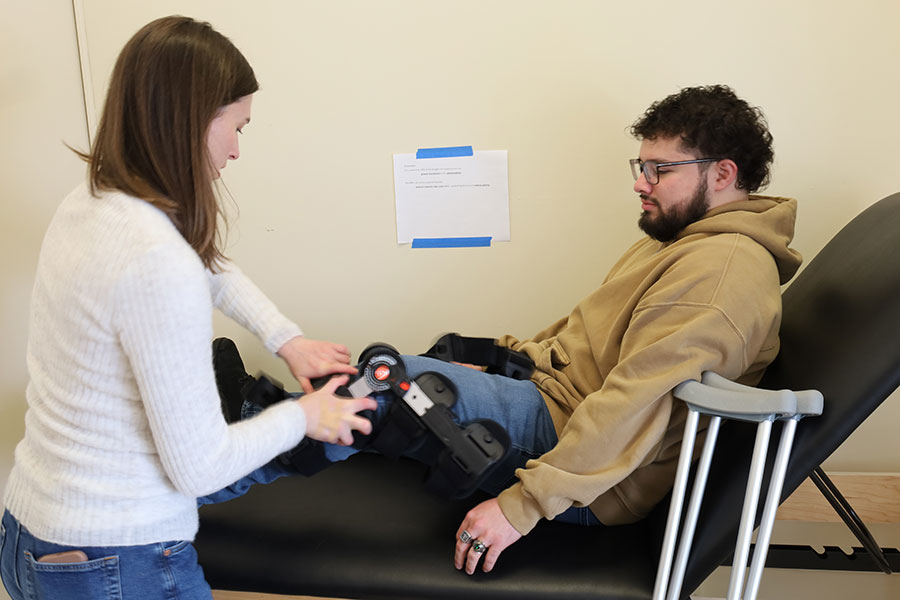
What I find so exciting about action observation + mental imagery interventions is how easily accessible they are. Anyone can watch a video and think about performing muscular contractions, and there is virtually no risk profile that I can think of. With how attached we all are to our devices, we have the ability to watch action observation videos in the palm of our hand; these techniques don’t require fancy equipment or trips to a rehabilitation clinic.
While more work certainly needs to be done to determine how these interventions work in longer immobilization periods and in immobilization with associated trauma (like a true injury or surgery), this is a very promising avenue of translational research that could be easily implemented into rehabilitation protocols. If we can preserve muscle strength during immobilization, rehabilitation timelines will decrease, which will result in lower total rehabilitation cost for patients. Hopefully with more research in this area, we can start to see these techniques be used more often in clinical settings.
What are your next steps with this research?
My next steps are to combine these interventions. Although we didn’t quite see muscle stimulation preserve strength, we did see that it was trending in that direction via some other muscular parameters. I’m interested in seeing if combining daily stimulation during action observation + mental imagery gives us even more robust results, and I’m working on a grant proposal to hopefully examine this in the future.
To learn more about academic programs, career opportunities, and research facilities in the Department of Exercise Science, visit the Falk College website.
Teaching on the Frontlines
Story highlights:
- School of Education students are introduced to real-life teaching scenarios through clinical simulations in which they interact with actors assigned to specific roles.
- Professor Ben Dotger incorporated the simulations into the School of Education curriculum 18 years ago and has expanded their presence to a number of groups and academic disciplines.
- As part of an ongoing course created through a National Science Foundation grant, students in an exercise science class gather physiological data during the education students’ simulations and are then tasked with analyzing and communicating the results.
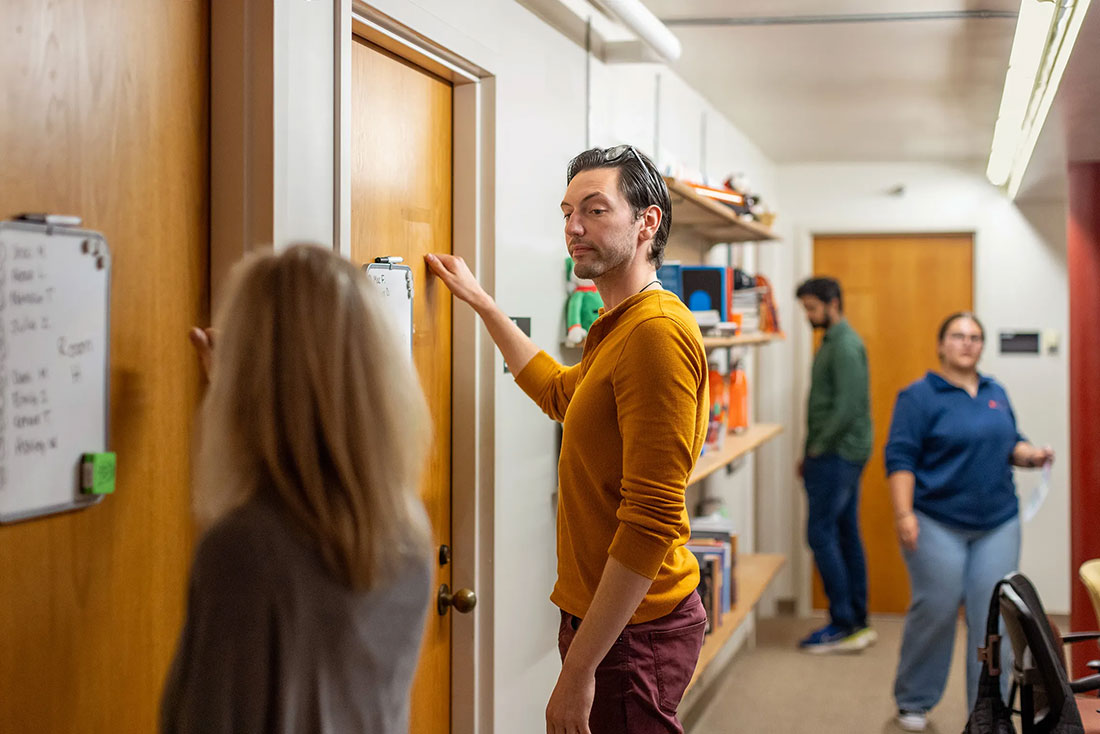
Carly Svec ’27 just experienced a grueling parent-teacher conference. A student’s father raised serious concerns about his daughter’s change in behavior and feared she may harm herself. That raised a red flag for Svec, who realized the need to set an intervention in motion. “There are so many curveballs that can be thrown at you in a parent-teacher conference and knowing how to approach it and be prepared is so important,” Svec says.
In reality, Svec had just completed a simulation. She is an inclusive childhood education major taking Clinical Simulations in K-12 Teacher Preparation (EDU 106), a foundational course in the Syracuse University School of Education that introduces students to a range of increasingly formidable real-life teaching scenarios through six clinical simulations (SIMs). In each simulation, students interact with actors—known as standardized individuals—who play a variety of roles that incorporate issues such as bullying, confrontational parents and colleagues, and climate change. As an integral part of the school’s curriculum, SIMs introduce more subject-specific interactions as teaching candidates progress through their studies.
“Every simulation is meant to be an educative challenge, because from the very start they’re going into a really complex human-helping profession in a K-12 school environment,” says Professor Ben Dotger, director of the Center for Experiential Pedagogy and Practice (CEPP). “We get into the nitty-gritty of what it is to be a teacher in the real classroom and the real school.”
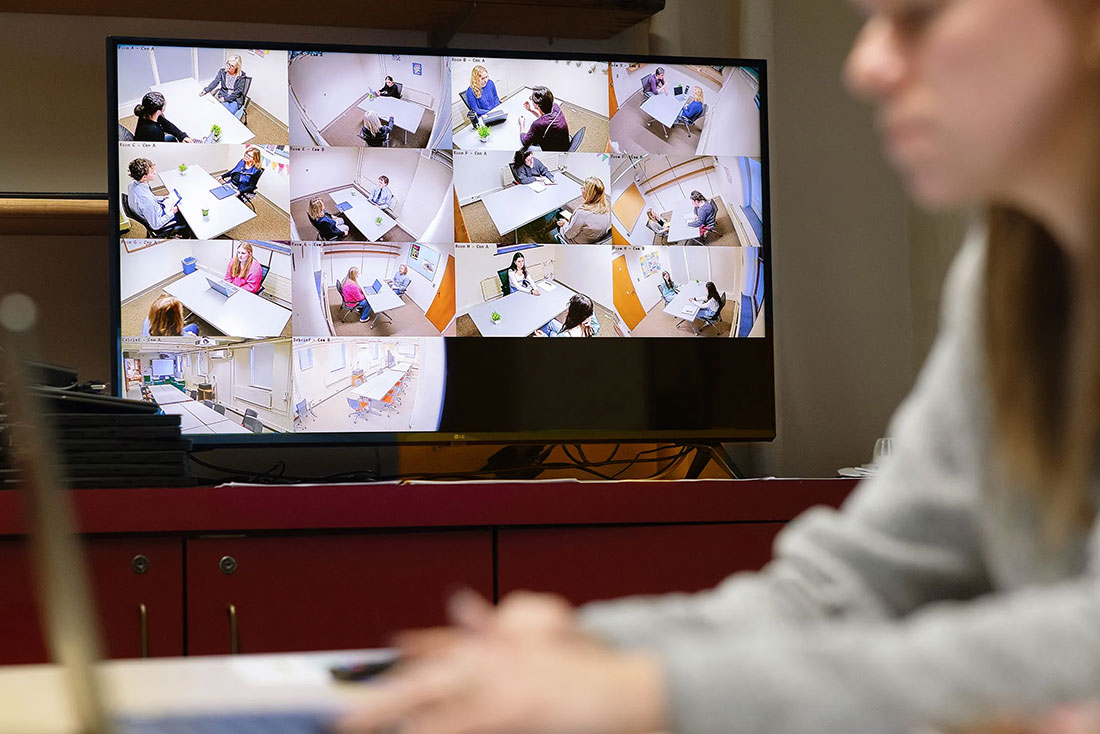
Expanding the Reach of Simulations
Aware that SIMs are a common training practice at medical schools, Dotger applied the idea to teacher preparation and introduced SIMs at the School of Education 18 years ago, partnering with SUNY Upstate Medical University, which shared access to its actors and simulation facility. “I knew early on that we had stumbled into a way of getting students excited about and attuned to serious content—if I could put them in a simulation first,” Dotger says.
Today, CEPP has a dedicated space in Huntington Hall that features six simulation rooms equipped with cameras and microphones and a monitoring room where student-actor interactions are observed and recorded. Dotger works with a team of undergraduate and graduate assistants who help organize and run the SIMs. All told, CEPP has a catalog of 114 SIMs. Along with ones for teacher preparation and specific subject matter, the center offers SIM training for school leaders, student veterans, creative arts therapy students and finance and management majors whose SIM challenges them with ethical situations.
“The platform gives you enormous flexibility to situate a learner and a standardized individual community member, client—you name it,” says Dotger, who continues to grow the program through outreach to different groups and disciplines. “My job is to think who could benefit from SIMs and then get colleagues to partner with me.”
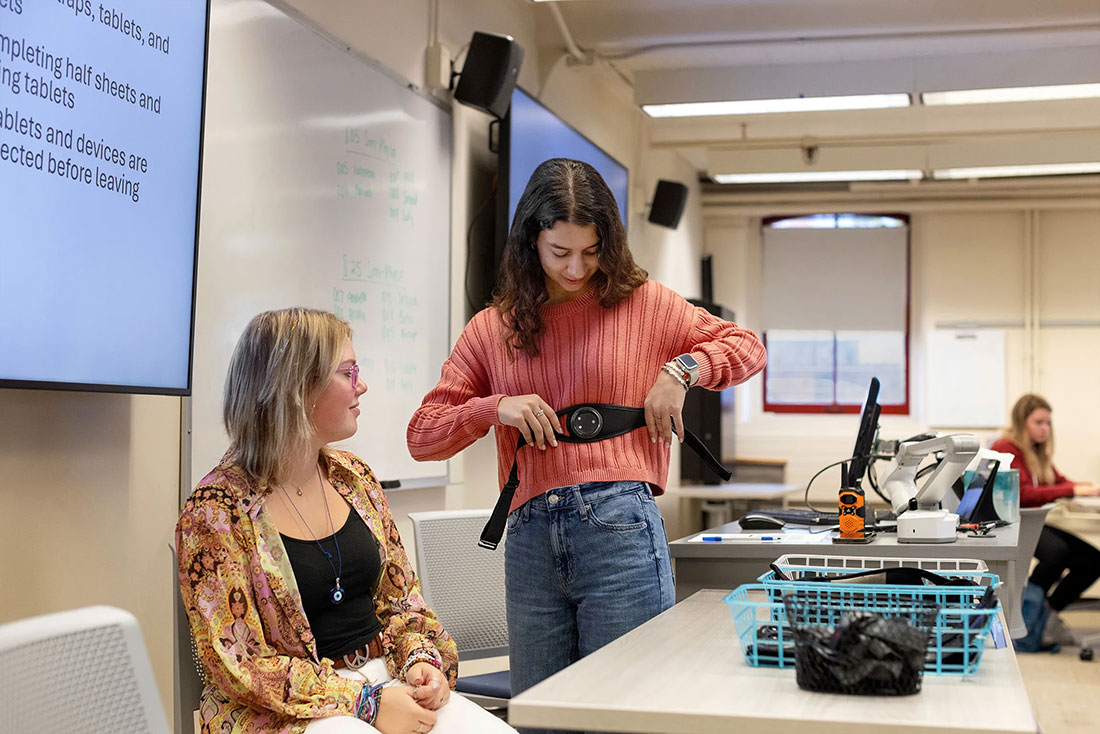
An Exercise Science Collaboration
On a Monday morning during the fall semester, some EDU 106 students are outfitted with sensors strapped around their chests and arms that record their heart and breathing rates, heart rate variability, movement and other physiological information. During the SIMs, Tiago Barreira, an exercise science professor in the David B. Falk College of Sport and Human Dynamics, and students in the course Simulation Physiological Data Science (EXE 300) view a large monitor that displays feedback in real time as SIMs play out in six rooms at the center.
The course was created three years ago with the support of a National Science Foundation grant that focuses on STEM education and communication. Pairing it with the SIM course gives the students real-time experience in collecting physiological data, analyzing it and communicating the results to the SIM students. “The data communication piece is key,” Barreira says. “The students not only get into research, but the main thing is learning how to communicate what the data means.”
EXE 300 student Isabel Alfonso ’24, a sport analytics major, and EDU 106 student Eli Burke ’26, an inclusive adolescent education and history major, found the communication interaction both nerve-racking and informative. “Obviously we’re all nervous in the simulation, and it’s cool to actually have data with time stamps that show where your heart rate spikes,” Burke says.
Lindsey Matthews ’25, a health and exercise science major, values the opportunity to conduct research and communicate the results face to face. “It’s a great communication experience because we’re learning how to communicate this data—I’m not just sending an email and telling you what it could mean,” she says. “You have to be able to facilitate a conversation with this person to communicate the data as well.”
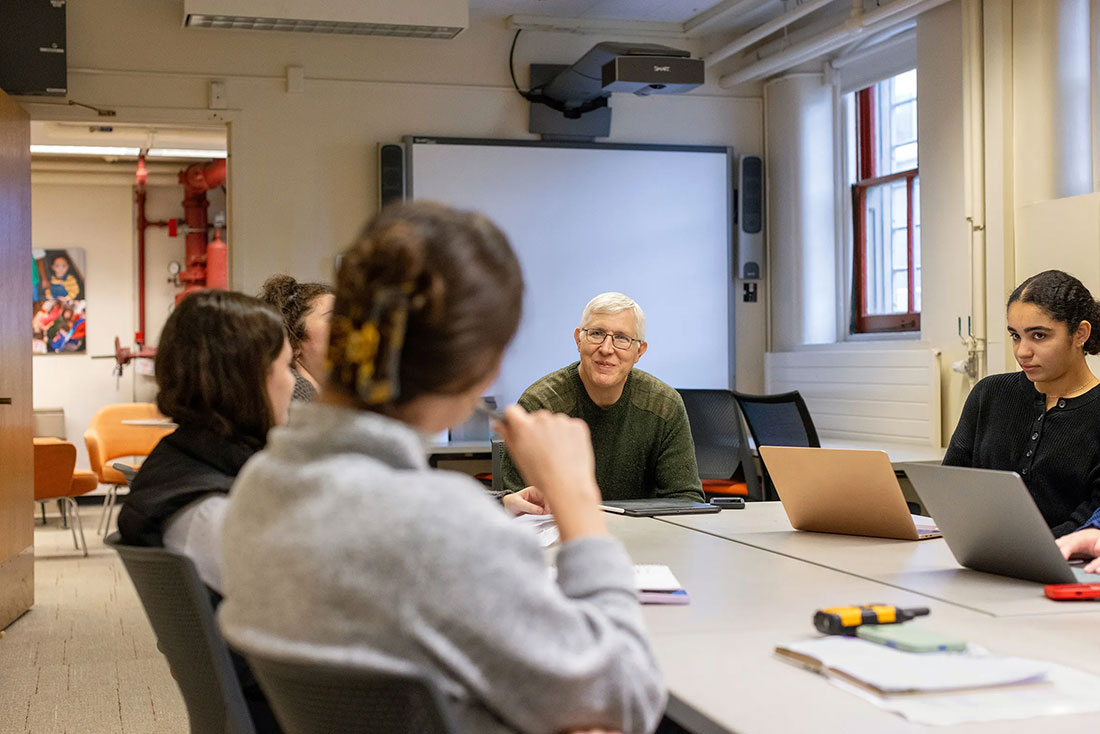
Review and Reflection
After completing their SIMs, the students meet in groups with teaching and curriculum doctoral student Julie Harnett ’18, G’19, a CEPP graduate assistant who leads them through a debriefing. Harnett, a former math teacher in the Syracuse City School District, asks questions, draws out important points and provides guidance on interacting with parents and how to handle a situation that involves mandatory reporting. “I love the class,” says Sophia Angelini ’28, an inclusive childhood education major. “The interactions are serious, and it’s helpful to have that pressure when you’re going into a simulation.”
Dotger calls the students’ shared experience—which includes class discussions and presentations of their SIMs performances—the “biggest community builder I’ve ever seen.” He wants them to collaborate, learn from one another and prepare themselves for their teaching careers. “You need to understand what it feels like when you’re having a serious professional conversation,” he says. “Understand that you’re not going to have all the skills from the very start, but you’ll learn them as you go and have chances to implement them in the next interactions.”
A Syracuse University story by Jay Cox originally published on Nov. 26, 2024.
Exercise Science’s Next Gen
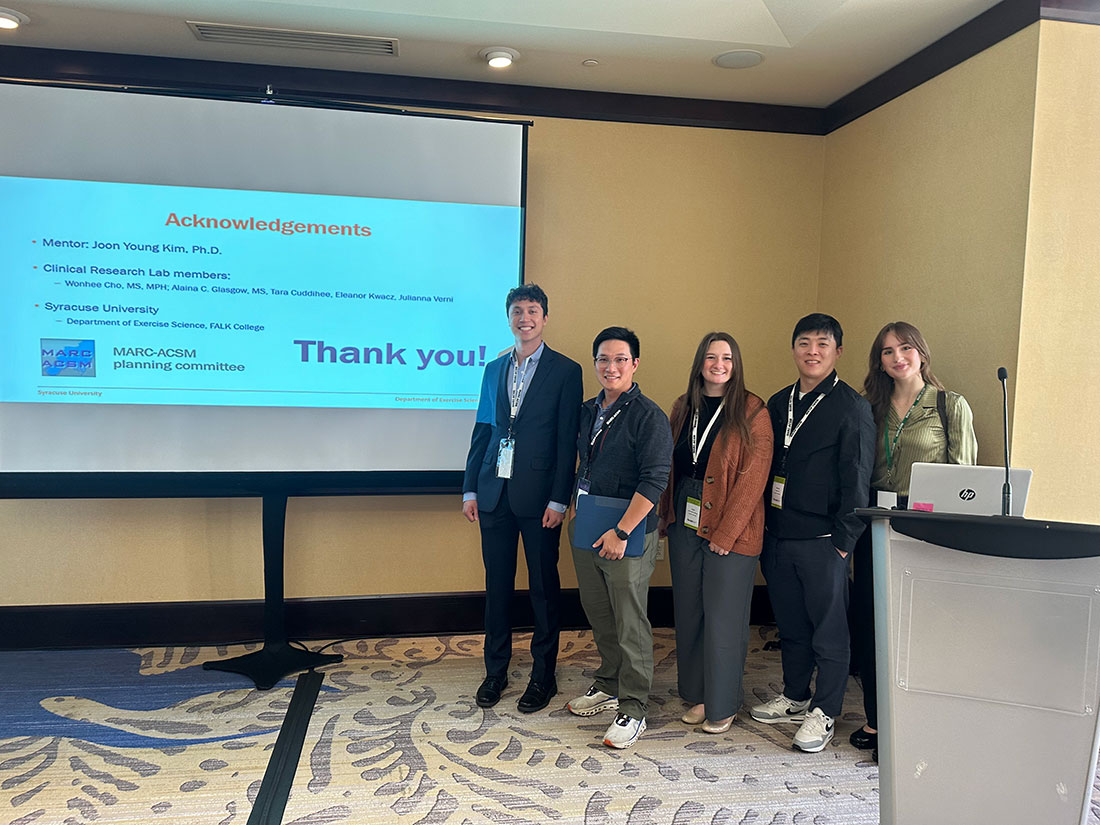
Four students in the Department of Exercise Science in the Falk College of Sport and Human Dynamics were recognized for their exceptional research at the recent Mid-Atlantic Regional Chapter of the American College of Sports Medicine (MARC-ACSM) annual conference in Lancaster, Pennsylvania.
Doctoral students Alaina Glasgow and Andrew Heckel and undergraduate student Tara Cuddihee presented their research at the conference, while doctoral student Wonhee Cho presented for undergraduate student Eleanor Kwacz, who was unable to attend. (Read more about Cho and his research later in this story).
Heckel’s study was selected as a top five doctoral abstract, and Kwacz’s research was chosen as a top five undergraduate abstract. Exercise Science Assistant Professor Joon Young Kim works with all four students on their research and says they “demonstrate an impressive level of scientific understanding, critical thinking, hard work, and dedication.”
“The students’ curiosity, intellectual rigor, and resilience in tackling complex challenges reflect not only their individual talents but also the supportive academic environment that fosters their growth,” Kim says. “These students represent the next generation of researchers, innovators, and problem-solvers.”
MARC-ACSM is comprised of a diverse group of professionals and students dedicated to the advancement of sports medicine and exercise science. The Mid-Atlantic Chapter represents Delaware, Maryland, New Jersey, New York, Pennsylvania, West Virginia, and Washington, D.C., and “the chapter seeks to communicate scientific information, provide a forum for research, foster professional peer interaction, and support career growth,” according to its website.
Two Falk College faculty members also presented at the conference: Exercise Science Associate Professor Tiago Barreira (Measuring Sleep with Wearable Devices), and Department of Nutrition and Food Studies Assistant Professor Jessica Garay (Moving Beyond Female Athlete Triad: Relative Energy Deficiency in Sport).
“This recognition strengthens Syracuse University’s reputation, opening doors to further collaborations, future funding opportunities, and increased visibility within the academic community,” Kim says. “It highlights the faculty’s mentorship, the quality of resources available to students through their mentor, department, college, and university, and the university’s role in advancing knowledge in their fields.”
To learn more about their research journey in Falk College, we asked doctoral student Andrew Heckel G’25 and Eleanor Kwacz ’27, a health and exercise science major on the pre-med track, to tell us about the MARC-ACSM conference, their presentations, and their mentors. Here’s what they wrote:
Can you describe your abstract that was selected as a top five abstract at the conference?
Eleanor: My abstract focused on whether baseline visceral fat could potentially be an influence on the interindividual differences seen in exercise intervention outcomes. In exercise interventions for type 2 diabetes, two individuals can follow the same protocol and see completely different results. This research sought to see if visceral fat may be the predictive element that can tell us if an individual would respond to exercise intervention, or if they would be a better candidate for a different intervention.
There was an ongoing HIIT (high-intensity interval training) intervention study within Dr. Kim’s lab, and we further analyzed this data to create my abstract. We found that low density lipoproteins and mean arterial pressure had greater improvements after exercise intervention in groups with high baseline visceral fat compared to low. This led us to conclude that there is reason to further research this topic.
Andrew: The title of the abstract we submitted was “The Potential Role of Physical Activity on Hypertension in Immigrants and Non-Immigrants.” We had originally set out to determine if physical activity might explain potential differences in hypertension prevalence between immigrants and non-immigrants. Using a publicly available dataset representative of the U.S. population, we found that hypertension prevalence was lower in immigrants compared to non-immigrants and that these differences were not due to physical activity.
These findings were interesting, so we dug a little deeper and found that immigrants were less likely to have health insurance coverage compared to non-immigrants. After running further analyses, we found that lower health insurance coverage in immigrants acted as a mediator for their lower hypertension rates. From this information, we concluded that immigrants may be less likely to receive a hypertension diagnosis; therefore, hypertension may be underdiagnosed in immigrant populations.
What does it mean to you for your abstract to be recognized at this prestigious conference?
Eleanor: I’m so grateful that the work being done in Dr. Kim’s lab is getting recognition. I know that none of this would have been possible for me without all of the members of our lab, especially Wonhee Cho. It means a lot that I was selected to represent our lab and all of the hard work that has gone into this research. This was such a unique opportunity!
Andrew: I’m happy that other people have read our research and feel that it’s important enough to be recognized at MARC-ACSM. I’m passionate about this project as it’s a topic that hits very close to home for me, so it makes me happy that our research is recognized in such a way that I’m able to share what I’m passionate about with a broader audience.
Who is your mentor, and what has that person meant to your academic career?
Eleanor: Dr. Kim kickstarted my career in undergraduate research by being willing to give a young and inexperienced freshman a spot in his lab. And since then, Dr. Kim has continued to share his wealth of knowledge with me and pushed me to research achievements I would have never dreamed of.
I never imagined I could be creating abstracts and presenting at an American College of Sports Medicine conference, and yet here I am. My academic career trajectory has been forever changed by Dr. Kim, and the opportunities he has pushed me to take will open doors I never saw as possible.
Andrew: I have been incredibly fortunate to work with Dr. Kim throughout this project and my entire Ph.D. journey. Dr. Kim was the one who encouraged me to explore this research project and submit the abstract to MARC-ACSM. We have continued working on this project and submitted a manuscript for publication, which I hope we’ll be able to publish soon so we can share our findings with an even larger audience.
Dr. Kim has been integral to my academic journey as he’s always encouraging me to pursue new research opportunities and always happy help to lend his advice and expertise to help me along my academic journey. I definitely don’t thank him enough for his mentorship, but I’m extremely grateful to have the opportunity to work with him and am a better student because of it.
What would you say to incoming or future Exercise Science students about your experience at Falk College?
Eleanor: I have been welcomed into Falk with the most open arms since my first day here. The Department of Exercise Science has the most amazing group of professors who are so knowledgeable and genuinely want students to be a part of what they are creating here.
When I was looking for research, every faculty member in the department was so happy to meet with me and tell me about what they were doing and how I could be a part of it. Falk College will offer you opportunities that you thought were never possible, from presenting at research conferences to the chance to climb Mount Everest, so take advantage of everything in front of you!
Andrew: The small bit of advice I would give to future Exercise Science students is to say “yes” to as many new experiences as you can. I’ve done so many things in the past four years that, if you told me at the beginning of graduate school that I would be doing these things, I would have probably laughed and told you that must have been thinking of someone else.
But the faculty members in our department are always presenting new opportunities to us, and some of my most enriching experiences have come from just saying “yes” to these opportunities, even if I didn’t feel like I was ready for them. I’ve been able to grow and become a better person because of these experiences, and I hope that other students will be encouraged to do the same.
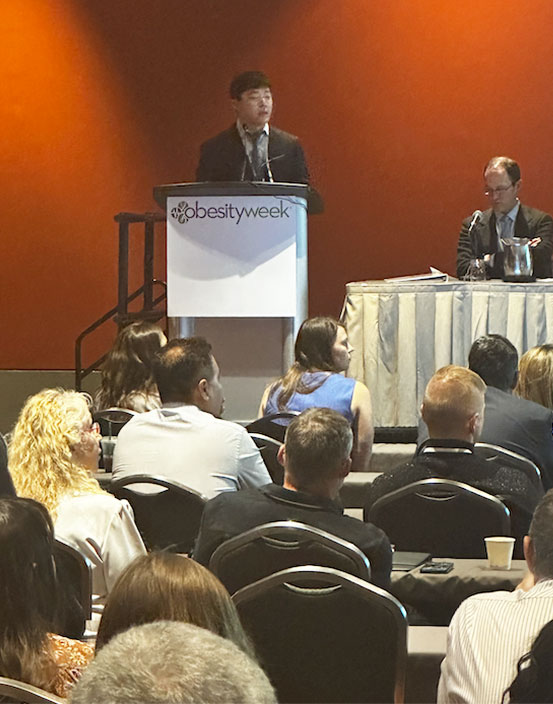
Stronger as a Team
Wonhee Cho, who presented for Kwacz at the MARC-ACSM conference, is another student who has made a significant impact the Department of Exercise Science.
Cho’s most recently published research, co-authored by Kim and his team members, appeared in Science Direct, one of the world’s leading sources for scientific, technical, and medical research. He recently presented his abstract at The Obesity Society annual meeting in San Antonio, Texas, where he received $1,500 for being selected as a finalist for the 2024 Ethan Sims Young Investigator Award.
Cho’s abstract presentation, “Relative Fat Mass as an Estimator of Abdominal Adiposity in Youth Across the BMI Spectrum,” was the result of a collaboration between Kim’s lab and UPMC Children’s Hospital of Pittsburgh, where Kim did his postdoctoral training before joining Syracuse University.
Heckel says he would have not been recognized by MARC-ACSM without the support and teamwork of his fellow lab mates, Cho and doctoral student Alaina Glasgow.
“Dr. Kim encourages us all to work together as a team, and I’m a better student and researcher today because of the people I get to surround myself with,” Heckel says. “I’m very thankful to have been able to work alongside Wonhee and Lainie during this project, and I’m excited for the future research we’ll all be able to do together.”
Visit the Department of Exercise Science website to learn more about Kim’s Clinical Research Laboratory and exercise science academic programs, experiential learning, and career opportunities. If you’d like to participate in research being conducted by the lab, contact Kim at jkim291@syr.edu.
Falk College FAQs
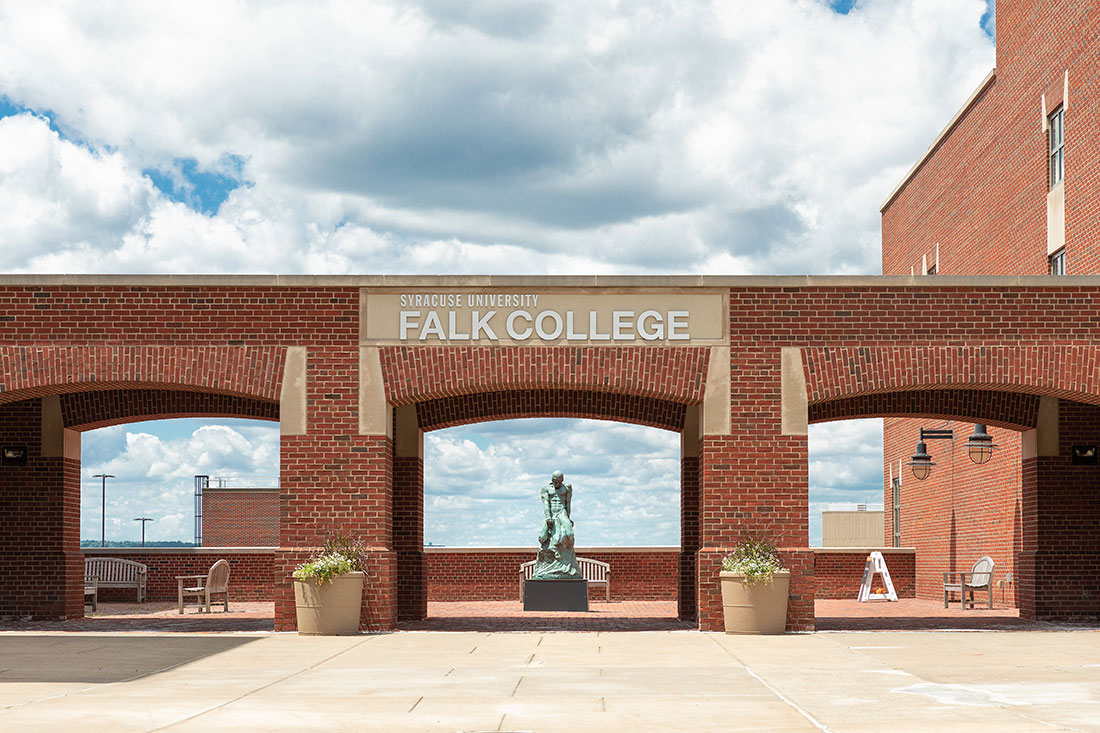
On Nov. 13, Syracuse University announced a go-forward plan to reshape the future of its human dynamics programs and reposition them for short- and long-term success. Here are frequently asked questions about the announcement:
What is the main objective of reshaping Syracuse University’s human dynamics programs?
The primary goal is to reposition and strengthen these academic programs to ensure their success and growth both in the short- and long-term. By consolidating programs and aligning them with colleges that have stronger academic synergies, Syracuse University aims to enhance the community impact, drive enrollment growth, advance research excellence, and better serve students and the broader communities in human, health, and social services.
What specific changes are being made to the human dynamics programs?
The reshaping plan involves the following key changes:
- Human Development and Family Science will merge with Marriage and Family Therapy, becoming one department (i.e., HDFS) within the College of Arts and Sciences.
- Public Health will move to the Maxwell School of Citizenship and Public Affairs.
- The School of Social Work will be housed in the School of Education.
These changes are designed to improve academic collaboration, expand research opportunities, and better align these programs with complementary academic disciplines.
When will these changes take effect?
The changes will go into effect on July 1, 2025. Students graduating through August 31, 2025, will participate in the Falk College of Sport and Human Dynamics commencement ceremonies, and students graduating after Sept. 1, 2025, will be participating in the commencement ceremonies of their new school or college. All students impacted by this transition will continue to receive their diploma from Syracuse University that includes their degree.
How were these changes determined?
These changes were based on an extensive four-month assessment conducted by the Human Dynamics Task Force, which involved input from faculty, students, alumni, and community stakeholders. The task force analyzed the current state of these disciplines, both on campus and at peer institutions, and provided recommendations, which in large part informed the go-forward plan.
Will students already enrolled in these programs be impacted by these changes?
Students currently enrolled in these programs will continue their studies as planned. Starting in Fall 2025, students enrolled in these programs will be placed within the school or college that houses their respective degree program.
Where will faculty and staff in the human dynamics programs be located after the changes?
Faculty and staff in the human dynamics programs will remain physically located in MacNaughton and White Halls–and Peck Hall for the Department of Marriage and Family Therapy–for the foreseeable future, even after the programs are realigned with other colleges.
What are the benefits of these changes for students and faculty?
For students, these changes will lead to stronger academic programs with greater interdisciplinary collaboration, enhanced research opportunities, and better preparation for future careers in human, health, and social services. For faculty, the realignment fosters stronger collaborations across colleges, supporting faculty scholarship and providing a more robust environment for research excellence.
Why is Syracuse University making these changes now?
The changes reflect Syracuse University’s commitment to adapting to the evolving educational landscape and ensuring that its human dynamics programs are positioned for long-term success. This restructuring will allow the programs to better meet the needs of students, faculty, and the communities they serve, while fostering greater academic synergies and promoting growth.
What role did the Human Dynamics Task Force play in these decisions?
The Human Dynamics Task Force, co-chaired by Falk College Associate Dean of Human Dynamics Rachel Razza and Associate Provost for Graduate Studies and Dean of the Graduate School Peter Vanable, played a central role in assessing the current state of the programs, gathering feedback from stakeholders, and formulating strategic recommendations. Their work involved cross-disciplinary collaboration and was instrumental in shaping the final plan for the realignment of these programs.
What is the long-term vision for the human dynamics programs at Syracuse University?
The long-term vision is to create stronger, more integrated programs that foster greater collaboration across disciplines and elevate the university’s impact in fields like human development, public health, marriage and family therapy, and social work. By realigning these programs with other colleges, the university aims to drive enrollment growth, enhance research, and better prepare students for professional careers in the human, health, and social services fields.
Go-Forward Plan

Following four months of deliberate assessment and cross disciplinary collaboration by members of the Human Dynamics Task Force, Syracuse University today announced a go-forward plan to reshape the future of its human dynamics programs and reposition them for short- and long-term success. The plan includes the consolidation of two departments and relocation of all human dynamics programs from the David B. Falk College of Sport and Human Dynamics to other schools and colleges with stronger academic synergies.
“From the beginning of this process, my priority has been developing and implementing a plan that repositions and strengthens the human dynamics academic programs, research and communitywide impact,” says Lois Agnew, interim vice chancellor, provost and chief academic officer. “This repositioning elevates our human dynamics programs, fosters stronger collaborations across colleges, advances faculty scholarship and better serves our students and the communities we serve.”
In June, task force members began assessing the current state of the human dynamics disciplines, both on campus and at peer institutions, aggregating feedback from key stakeholders and compiling recommendations for how these programs can be positioned for success and growth in the future. As part of the go-forward plan:
- Marriage and family therapy will merge with human development and family science and become one department within the College of Arts and Sciences.
- Public health will join the Maxwell School of Citizenship and Public Affairs.
- Social work will be housed in the School of Education.
These changes, informed in large part by task force recommendations, are designed to enhance the academic and community impact of these programs, grow enrollment, drive research excellence and strengthen the University’s long-standing commitment to preparing professionals to thrive in human, health and social services. They will go into effect July 1, 2025.
“I am grateful to the members of the task force for their thorough, thoughtful and strategic recommendations. I also extend my appreciation to the many students, faculty and staff who provided feedback along the way—through surveys, engagement sessions and other opportunities for submitting input. Their participation in this process and candid feedback were invaluable,” says Provost Agnew.
Today’s news follows an April announcement that the Falk College of Sport and Human Dynamics will become the Falk College of Sport, the first standalone college on an R1 campus that specifically focuses on sport through a holistic academic lens. As part of the Falk transformation, the University convened the Human Dynamics Task Force, co-chaired by Rachel Razza, associate dean for human dynamics, and Peter Vanable, associate provost and dean of the Graduate School. The task force, which consisted of human dynamics faculty representatives elected from each department, staff and community partners, delivered a final report to the provost last month.
“This work required a commitment to collaboration, a willingness to engage in challenging but necessary dialogue and a shared focus on the immediate and long-term future of the human dynamics academic disciplines,” says Vanable. “Associate Dean Razza and I are grateful to our fellow task force members for their time, dedication and outstanding work. We also appreciate the provost’s commitment to upholding the spirit of our recommendations and look forward to seeing these programs thrive in the future.”
Razza says, “Syracuse University has long been a leader in interdisciplinary education. The task force agreed that taking a reimagined approach to the human dynamics programs furthers our mission to provide students with a robust, future-focused education that emphasizes both theory and practice. I believe all members of the human dynamics community—students, faculty, staff and Central New York partners—benefit from this important realignment.”
Students currently enrolled in these programs will transition to their new schools and colleges effective July 1, 2025. Students enrolling in these programs in fall 2025 will matriculate into the school or college housing their academic program.
A Syracuse University News story originally published on Nov. 13, 2024.
‘Overflowing with Empathy’
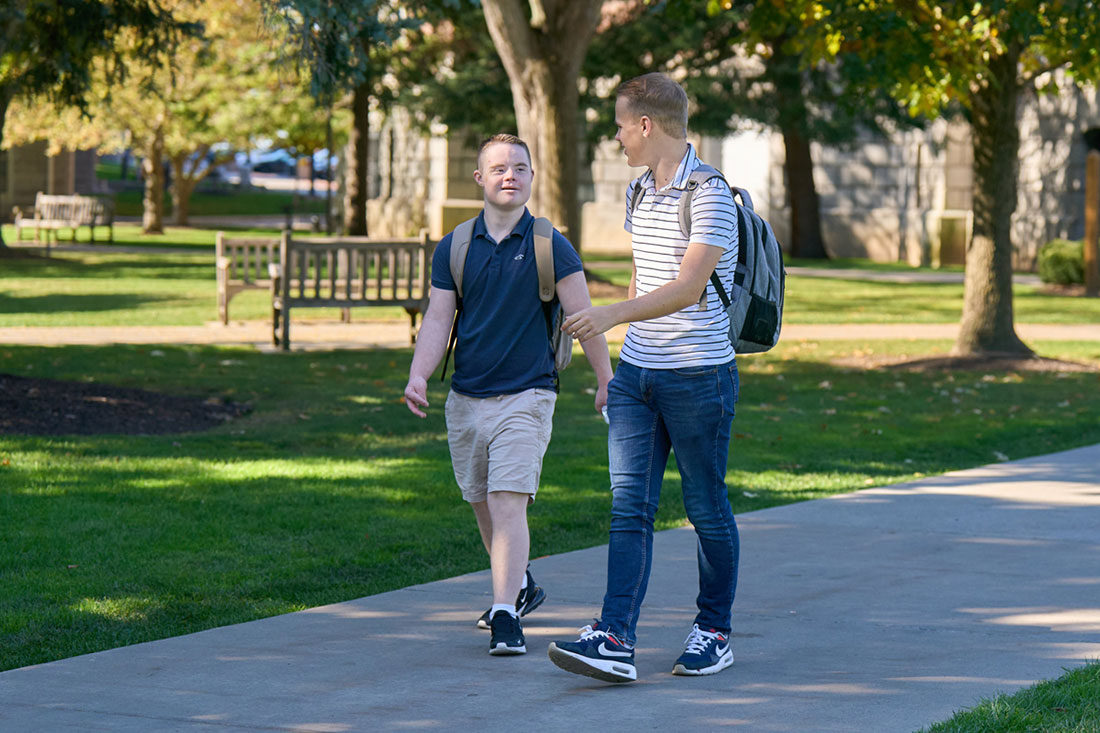
When do children learn empathy? How do they know that someone is in pain or having a bad day?
From an early age, Mark Radel ’28 always demonstrated compassion for his peers. As a precocious 9-year-old, Mark would rush onto the basketball court (accompanied by the coaches) whenever someone got hurt to check in and offer a helping hand.
Luke Radel ’26 says empathy is his brother’s superpower. “Mark is overflowing with empathy, and he has a great ability to know if somebody is having a bad day, and what he can do to help them through it,” Luke says, with a proud smile—and that trait will serve Mark well as he strives for a career in sports and exercise science as an athletic trainer.
Mark’s career ambition is being supported by InclusiveU, an initiative from the Taishoff Center for Inclusive Higher Education that sets a high standard among inclusive higher education programs, making higher education more accessible for people with intellectual and developmental disabilities through individualized and inclusive coursework, student-centered planning, internships, and social and extracurricular activities.
“I want to help people. I’m loving learning about the body, and how what we eat helps make us strong, and when I graduate, I want to work with my football team, the Buffalo Bills, as a trainer,” says Mark, a sports and exercise science major at the University who was born with Down syndrome.
An Unbreakable Bond
Mark’s benevolent spirit helped Luke during his darkest days. While visiting colleges with his family in Boston, Massachusetts, Luke, an aspiring broadcast journalist, was out to dinner when he discovered his voice had left him. Realizing there was a potential health problem, Luke checked into Massachusetts General Hospital for observation.
Within a few hours, the doctors gave Luke their diagnosis: Stage 4 Hodgkin lymphoma. With his head spinning, Luke began undergoing chemotherapy sessions twice a month for six months, oftentimes for five or more hours per visit. What got him through those trying times?
“Mark was by my side, and his compassion was so helpful. Plus, he gives the best hugs. Whenever I was having a bad day, those hugs were just amazing and turned my day around,” says Luke, whose cancer is in remission. “Mark’s had his fair share of health struggles, and in that moment, I realized what Mark overcomes every day just to keep going, all the work he does to go to school and live his life. If he’s taking on that daunting situation every single day, I can take care of my chemotherapy.”
When Luke decided to attend Syracuse University and study both political science in the Maxwell School of Citizenship and Public Affairs and broadcast and digital journalism in the S.I. Newhouse School of Public Communications, Mark decided to follow in his brother’s footsteps, applying to and being granted admission into InclusiveU’s highly competitive program.
Their unbreakable bond was further strengthened as roommates on campus. Luke helps Mark with his homework and with prepping his meals, and configured Mark’s Google Maps app on his phone with the relevant directions needed for Mark to traverse campus on a daily basis.
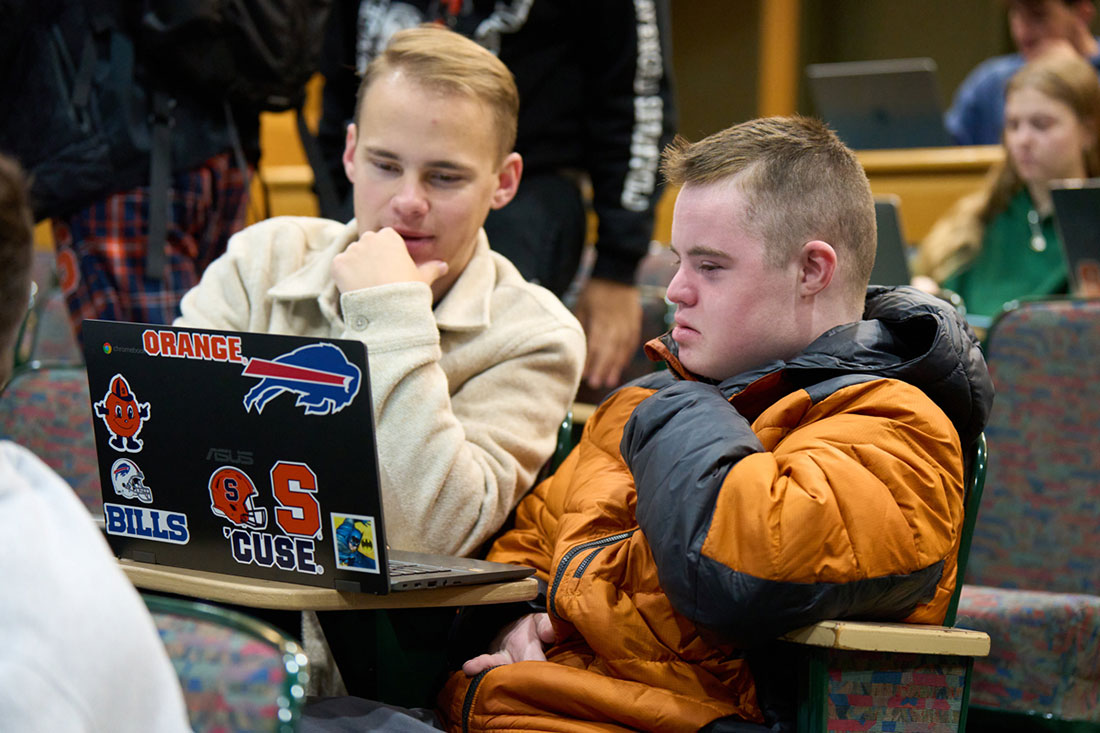
“Mark is Mr. Independent on campus. He doesn’t want to rely on someone else to help him get across campus. He’s done an amazing job of navigating everything it takes to be a student,” Luke says. “I’m really grateful to be at an institution like Syracuse that is always striving to ensure everybody has access to the opportunities they need to succeed and feel welcome in these spaces.”
Life-Changing Opportunities
From the moment Mark came into his life, Luke has embraced advocating on behalf of his brother, fighting to ensure he was given access to every possible opportunity. It’s part of the Radel family’s genetic makeup. Their father, Patrick, was an attorney who helped people with mental and developmental disabilities be included in their elementary and high school’s educational programs, and their mother, Mary, created a support group, the 21 Club, that raises awareness and educates and connects parents of children born with Down syndrome to resources.
October is Down Syndrome Awareness Month, which, Luke says, is the perfect time for members of the University to learn how people with Down syndrome are valuable contributors to the University community.
“People with Down syndrome are more alike than they are different from us. Mark needs to be in environments that will push him outside of his comfort zone and push the limits of what a person with Down syndrome can accomplish,” Luke says. “You’ll be helping Mark by interacting with him, but you’re also helping yourself gain a better understanding of how people with Down syndrome see and interact with the world around them.
Inspired to become a broadcast journalist from his efforts advocating on Mark’s behalf, Luke has amassed an impressive portfolio as a broadcast journalist, recently covering both the Republican and Democratic national conventions and serving as a multimedia journalist for WKTV in Utica, New York.
Luke hopes to use his dual degrees to continue telling impactful stories that make a difference, including his brother’s inspirational journey to Syracuse University.
“I always wanted to go to college, and being here with my brother has been amazing. This experience has changed my life,” Mark says.
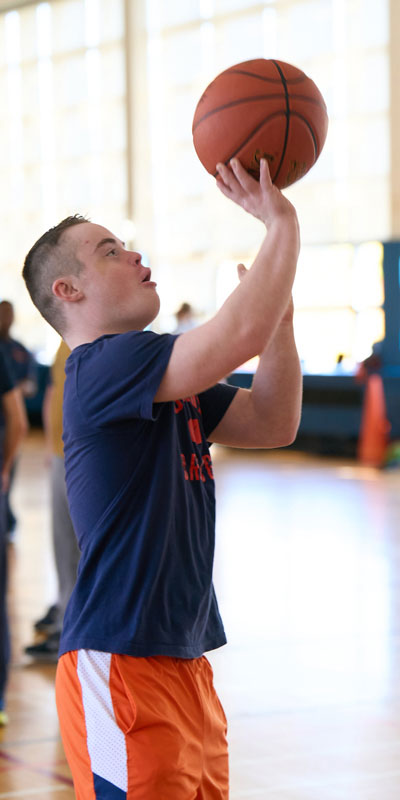
Sports as a Unifying Force
The table tennis area in the lounge of Luke’s off-campus apartment complex is getting quite the workout on a Tuesday morning before they both have class in the Falk College of Sport and Human Dynamics. Good-natured comments fly back and forth whenever a point is scored. Their friendly matches, typically a best two-out-of-three affair, offer insights into their dynamic.
“It’s fun to play sports and I like learning new things while I am playing,” Mark says. “And I like to beat Luke. We always have fun when we play.”
“Oh yeah, this is always fun whenever we play [table tennis]. Mark loves watching and playing sports because it’s exciting and fun for him, and it’s a great way to stay active and also be part of a team and a community. Mark just loves being around people,” Luke adds.
Outside of their sibling showdowns in table tennis, Mark also participates in the Special Olympics Unified Sports club basketball team on campus, practicing every Sunday in the Women’s Building.
Surrounded by friends, Mark takes great pride in his basketball abilities. “It’s fun to shoot, dribble the ball and then pass it to my teammates, but what I’m really good at is shooting and scoring,” Mark says with a smile—but more than his performance, he enjoys the camaraderie and friendships that form with his peers.
“It’s the best. We cheer each other on, cheer for big shots and we all want everyone to play well and have fun,” Mark says. “I play better when my teammates are cheering me on, yelling ‘Mark, Mark, Mark!’ It makes me happy and motivates me.”
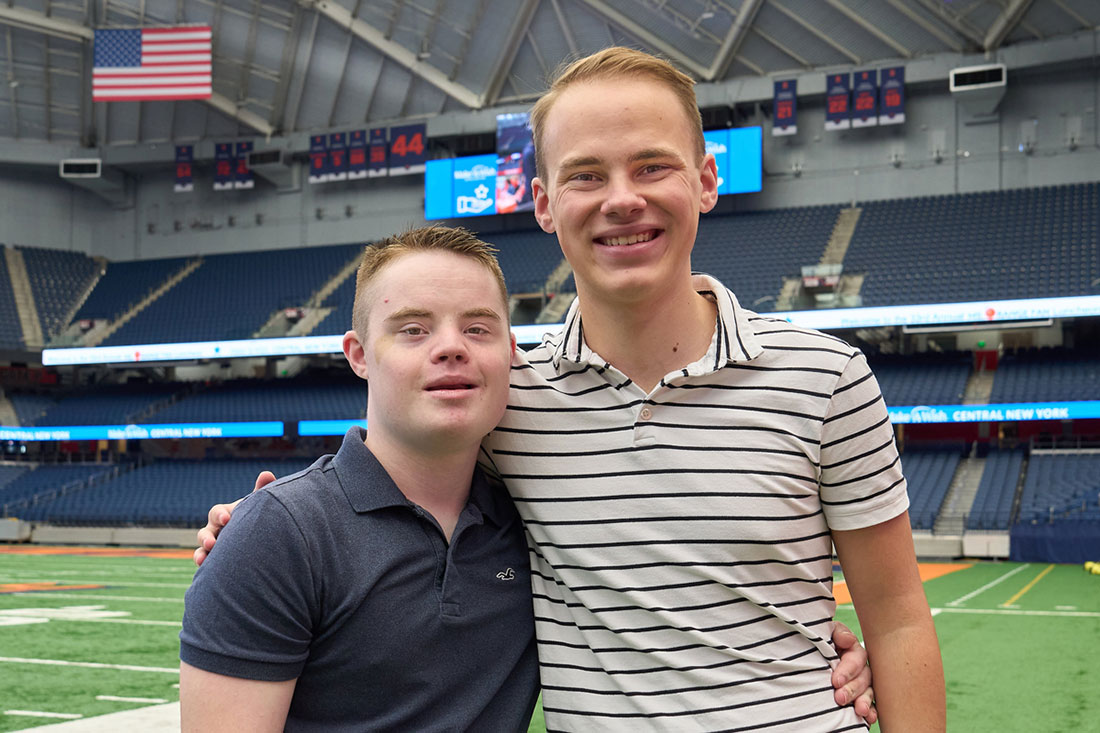
An avid fan of the Syracuse University football team, Luke and Mark eagerly await each home game. Mark can often be found yelling and cheering on the team while wearing his No. 6 Syracuse jersey, originally purchased to honor former starting quarterback Garrett Shrader ’23, but this year, the jersey is a nod to current starting quarterback Kyle McCord ’25.
From his seats in the 300 section inside the JMA Wireless Dome, fans flock to Mark’s infectious attitude, exchanging fist bumps and high-fives every time Syracuse comes up with a big play.
“It’s really cool and it makes me feel great to know I’m making new friends while we’re cheering on Syracuse,” Mark says.
“Mark has such a big smile on his face when he’s interacting with our fans, and it makes me so happy to see his joy,” Luke adds.
A Syracuse University News story by John Boccacino originally published on Oct. 21, 2024.
Page 2 of 10
